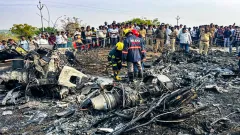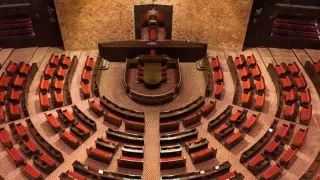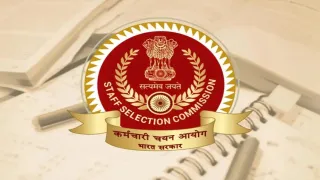Bangladesh’s political landscape has entered one of its most turbulent phases as the shocking news of a death sentence for former Prime Minister Sheikh Hasina has sent waves of celebration, outrage and geopolitical tension across the region. While many protesters in Dhaka viewed the verdict as long-awaited justice for years of alleged oppression, the reality remains far more complex. Hasina is not in Bangladesh to face the gallows; instead, she is living in exile in New Delhi, placing India at the centre of a diplomatic storm.
For many young protesters, the verdict is symbolic rather than final. They believe it is a step toward accountability for the violence, disappearances and political suppression they associate with her rule. Yet the challenge lies in the aftermath—Bangladesh demands her return, but India finds itself unable, and perhaps unwilling, to hand her over due to political sensitivities, regional strategy and historical ties. This has created a growing rift between the two neighbours, threatening to reshape their long-standing alliance.
As tensions sharpen, analysts caution that the situation extends far beyond a single verdict. It touches on questions of sovereignty, political legitimacy, cross-border alliances and the shifting balance of power in South Asia. While the death sentence marks a dramatic chapter in Bangladesh’s internal struggle, its diplomatic implications may be far more enduring, influencing trade, security cooperation and regional influence in the years ahead.
Bangladesh Celebrates Verdict as Symbol of Justice
The sentencing of Sheikh Hasina has been received with applause among sections of Bangladesh’s youth, particularly student groups who were at the centre of the protests that escalated into nationwide unrest. Many families who lost loved ones during past crackdowns saw the verdict as a long-awaited acknowledgment of their suffering. For them, the judgment represents a moral victory and a rare instance where political power faces accountability.
However, behind the jubilation lies a deep sense of grievance. Many protesters emphasise that justice is incomplete unless the sentence is carried out within Bangladesh. Their calls for public accountability reflect years of frustration under a government they viewed as authoritarian. This sentiment has only intensified since the political transition that followed her departure, with the new leadership positioning itself as a defender of democratic aspirations.
Hasina’s Exile in India and Diplomatic Fallout
Sheikh Hasina has been staying in New Delhi since fleeing Bangladesh amid massive protests that stormed the capital. Her presence in India has deepened distrust between the two countries, as Bangladesh has repeatedly urged her extradition on the grounds of legal responsibility. Officials in Dhaka argue that India has an obligation to send her back, citing existing mutual agreements.
New Delhi, however, views the situation through a different lens. Indian policymakers argue that the charges against her may fall under political persecution, which is protected under extradition exceptions. The Indian government is wary of handing her over due to internal political implications, security considerations and the long-standing history between the two nations. As a result, India’s refusal—implicit or explicit—has added strain to bilateral ties, contributing to a climate of diplomatic unease.
Historical and Personal Ties Complicate Extradition
Sheikh Hasina’s personal history with India stretches back decades, making the current situation even more sensitive. After the assassination of most of her family members in 1975, she found refuge in India for several years, which nurtured a political relationship rooted in trust and shared interests. This connection continued during her years as prime minister, where cooperation between the two nations grew significantly across trade, security and regional development.
India’s longstanding support for Hasina’s leadership has shaped bilateral policies and fostered mutual reliance. For New Delhi, handing her over would conflict with its own strategic priorities, potentially empowering political forces in Dhaka that have openly criticised India. This makes the decision far more complex than a simple legal obligation and places India in a morally ambiguous position, balancing regional stability with diplomatic loyalty.
Bangladesh’s Political Transition and Rising Tensions
Bangladesh’s current administration, formed after Hasina’s departure, has adopted a more assertive stance toward India. It has pushed for Hasina’s return with increasing urgency while simultaneously building new alliances that do not depend on New Delhi’s support. This shift marks a potential reorientation of Bangladesh’s foreign policy, with implications for trade partnerships, security frameworks and regional influence.
The change in leadership has also intensified internal debates. While some support a strong break from the past, others warn that weakening ties with India could disrupt economic cooperation and border management. At the same time, the population remains deeply divided over Hasina’s legacy—some view her as an oppressor, while others credit her with economic progress. The sentencing has amplified these divisions, turning political debates into emotionally charged confrontations.
India’s Strategic Dilemma
India now finds itself in a diplomatic crossroads. On one hand, its relationship with Bangladesh is vital for regional security, trade routes, water sharing agreements and border stability. On the other hand, surrendering Hasina could be interpreted as endorsing what Indian analysts describe as politically motivated decisions by Bangladesh’s new rulers. Such a move could also embolden anti-India factions within Bangladesh, further complicating bilateral dynamics.
For New Delhi, the safest path may be a cautious wait-and-watch approach. By avoiding drastic diplomatic steps, India hopes to maintain formal relations without exacerbating tensions. It also aims to keep channels open with other political stakeholders in Bangladesh, anticipating that future elections may bring new opportunities to rebuild trust and cooperation.
Public Sentiment and Calls for Accountability
Public reaction across Bangladesh remains intense. Many citizens argue that Hasina must face the consequences of her alleged actions and see the death sentence as an important milestone in the pursuit of justice. Their calls for accountability reflect broader demands for political transparency and human rights protections in the country.
At the same time, the consequences of politically charged verdicts can be unpredictable. While it has satisfied some groups, it has also raised questions about due process, political motivations and the danger of retributive justice. These concerns highlight the complexities that arise when legal outcomes intersect with political narratives, particularly in fragile democracies.
Future of Bilateral Relations and Regional Stability
The coming months will be crucial in determining the trajectory of India-Bangladesh relations. As both nations navigate this sensitive period, external factors—such as regional power rivalries, economic dependencies and internal political pressures—will influence their decisions. The challenge lies in maintaining stability while addressing the deep-rooted tensions triggered by Hasina’s exile and sentencing.
Despite the strain, both nations recognise that long-term hostility is not sustainable. India and Bangladesh share extensive cultural ties, economic interdependence and geographic proximity that require cooperation. Whether they manage to overcome the current crisis depends on diplomatic patience, political maturity and a willingness to engage in constructive dialogue beyond the issue of extradition.
A Turning Point in South Asian Politics
Sheikh Hasina’s sentencing has become more than a national legal matter—it has evolved into a regional political moment that may redefine alliances and power dynamics across South Asia. Her presence in India adds layers of complexity, transforming a domestic verdict into an international flashpoint. As analysts suggest, her political story may not be over, and the long-term effects of this verdict may continue to shape South Asian politics for years.
Ultimately, the unfolding situation underscores the fragility of political systems and the far-reaching impact of leadership decisions. As Bangladesh and India confront this diplomatic challenge, the choices they make today may determine the future of their relationship—and the stability of the broader region.
Also Read: ED Raids Al-Falah University in Explosive Delhi Blast Probe























